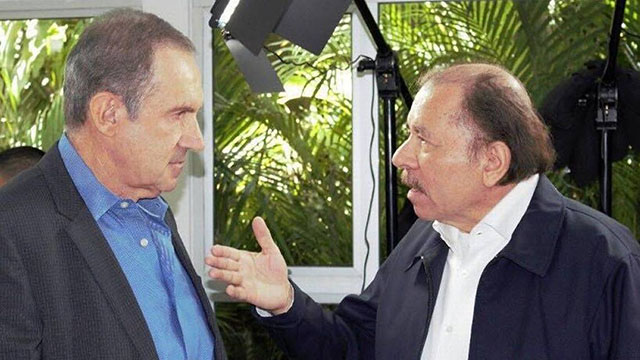
During the interview, which took place July 28 in Managua, Ortega claimed that the death toll in Nicaragua’s anti-government protests over the past three months was of 195 people.
He claimed that the Organization of American States (OAS) Human Rights Commission, Human Rights Watch and other human rights groups have their figures wrong because they allegedly rely on death reports rather than on documented deaths. In addition, Ortega claimed that many of the dead were policemen and pro-government activists.
Really?, I asked. I noted to him that OAS Human Rights Commission president Paulo Abrao had told me that more than 90 percent of the dead were killed by Ortega’s paramilitary gunmen. Ortega replied, “He’s lying.”
Ortega claimed that of his total number of 195 deaths, 22 were policemen, and 44 were pro-government Sandinista activists. When I noted to him that, according to my math, that would account for only 66 of 195 victims, Ortega added that “there are also government workers” among the dead, and claimed that many of the reported deaths were “invented.”
I told Ortega that it’s difficult to “invent” a person’s death. There are always close relatives and co-workers who could deny a false report, or the missing person can show up and put the matter to rest. Besides, all major human rights say they have double-checked the death reports.
But what’s most surprising about Ortega’s statements is that even by his own claim that 66 of the dead allegedly were policemen or pro-government activists, his regime is responsible for a majority of the deaths. That sounds like an unintended admission of guilt, or could be read that way in a court of law.
More than 300 deaths by conservative counts is a huge number, considering that Nicaragua is a small country of only 6 million people. It’s more than twice the number of people who died in Venezuela – a country of 32 million – in last year’s bloody riots.
Another thing that surprised me was Ortega’s effort to befriend Trump. While White House spokesmen and the State Department have announced new sanctions against Nicaragua, Trump himself has remained notably silent about the Ortega regime.
At one point in our interview, which was previewed by The Miami Herald and later aired by CNN en Español, Ortega blamed the United States for supporting an alleged “coup” against his government. But he didn’t blame Trump.
When I asked Ortega why would Trump want to topple his regime when the U.S. president has proven to love dictators — he has befriended the leaders of Russia, North Korea, Turkey and other authoritarian regimes — Ortega replied that “it’s not President Trump.” He claimed that it’s “a group of Miami-based legislators” in the U.S. Congress who are trying to topple him.
Ortega also gave his first serious interview in almost a decade to Fox News — Trump’s favourite network and de facto propaganda machine —- on July 23, obviously trying to get the president’s attention. And Ortega said on July 24 that “it would be ideal” to hold a meeting with Trump.
As Edmundo Jarquin — a former Sandinista official who now opposes Ortega — says, Ortega is most likely trying to be seen by Trump “as the only guarantee of stability in Nicaragua, and as Trump’s best bet to avoid a larger organized crime, migration and economic crisis in Central America.”
Ortega should not be allowed to get away with that view. It’s time for Trump to personally speak out about Nicaragua’s bloodshed, rescind his cruel decision to deport 2,500 Nicaraguan immigrants who enjoyed TPS residency status and ask his buddy Vladimir Putin to end Russia’s economic and political support for Ortega.
Even by Ortega’s count, this is proportionally the bloodiest political crisis in Latin America. There should be much more international pressure on Ortega to accept a negotiated solution to the crisis, with early elections.





